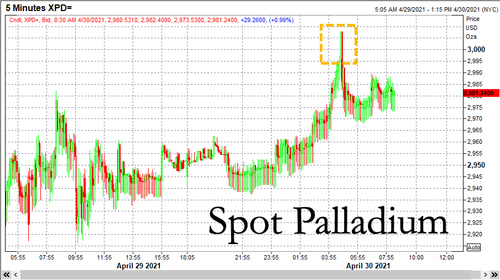Palladium Tops Record $3,000 Amid EV-Demand Surge, Supply Chain Pressure
Tyler Durden
 Palladium futures climbed Friday to over $3,000 an ounce for the first time as the market is worried about a shortage of the precious metal used mainly by automakers in exhaust systems and green technologies such as hydrogen power. Palladium futures climbed Friday to over $3,000 an ounce for the first time as the market is worried about a shortage of the precious metal used mainly by automakers in exhaust systems and green technologies such as hydrogen power.
Palladium briefly rose above $3,000 an ounce around 0445 ET. As of 0828 ET, palladium was up 1% at $2,981.
Prices have erupted since March 16, up more than 20% since Nornickel, a Russian nickel and palladium mining and smelting company, announced flooding at two of its mines.
Since the COVID low in March 2020, palladium prices have jumped more than 100%.
"Many people thought palladium at $1,000 was a bubble. Wow was that wrong," R. Michael Jones, chief executive officer at Platinum Group Metals Ltd. PLG, told MarketWatch. "As the world economy emerges from a COVID economic lockdown, personal transport will almost certainly be very popular."

Given that, "palladium looks very good here in the short and medium-term," Jones said." Long term new applications for palladium and the other platinum group metals look interesting" in terms of the energy transition from hydrogen to batteries, he added.
UBS analyst Giovanni Staunovo told Reuters that palladium has been in a "structural deficit for ten years. We have seen above ground inventories falling to very low levels."
Lower inventories of the precious metal come as the global economy, supercharged by central banks and governments unleashing trillions of dollars into financial markets and real economies, has produced a demand surge from consumer and industrial goods.
Chris Blasi, president and chairman at Neptune Global, told MarketWatch that "increased automobile production directly drives increased demand for palladium, which is drawing on a strategic metal whose annual industrial demand has outstripped mine output for several years."
Palladium is primarily used in catalytic converters in fossil fuel burning vehicles to help control emissions. Earlier this year, we noted catalytic converter thefts across the US skyrocketed as thieves take advantage of higher prices at scrap yards.
Platinum is another precious metal used in catalytic converters that have seen prices soar to a six-year amid supply shortages.
Palladium is strongly outpacing gold in hopes that more stimulus will create a more robust industrial rebound.

So the combination of an actual shortage of the precious metal, an artificially supercharged global economy, a green transition, and, of course, momentum traders and anyone trying to make a quick buck has pushed Palladium prices to the moon.
 our mission: our mission:
to widen the scope of financial, economic and political information available to the professional investing public.
to skeptically examine and, where necessary, attack the flaccid institution that financial journalism has become.
to liberate oppressed knowledge.
to provide analysis uninhibited by political constraint.
to facilitate information's unending quest for freedom.
our method: pseudonymous speech...
Anonymity is a shield from the tyranny of the majority. it thus exemplifies the purpose behind the bill of rights, and of the first amendment in particular: to protect unpopular individuals from retaliation-- and their ideas from suppression-- at the hand of an intolerant society.
...responsibly used.
The right to remain anonymous may be abused when it shields fraudulent conduct. but political speech by its nature will sometimes have unpalatable consequences, and, in general, our society accords greater weight to the value of free speech than to the dangers of its misuse.
Though often maligned (typically by those frustrated by an inability to engage in ad hominem attacks) anonymous speech has a long and storied history in the united states. used by the likes of mark twain (aka samuel langhorne clemens) to criticize common ignorance, and perhaps most famously by alexander hamilton, james madison and john jay (aka publius) to write the federalist papers, we think ourselves in good company in using one or another nom de plume. particularly in light of an emerging trend against vocalizing public dissent in the united states, we believe in the critical importance of anonymity and its role in dissident speech. like the economist magazine, we also believe that keeping authorship anonymous moves the focus of discussion to the content of speech and away from the speaker- as it should be. we believe not only that you should be comfortable with anonymous speech in such an environment, but that you should be suspicious of any speech that isn't.
www.zerohedge.com
| 



